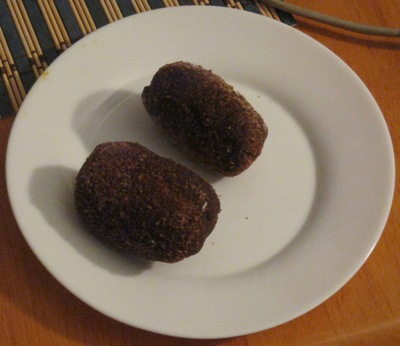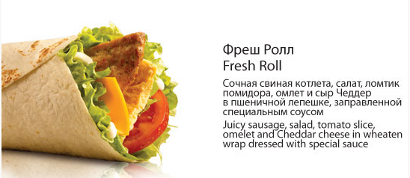Categories: "Food"
Готовить/приготовить, часть вторая
The verb готовоить/приготовить means ‘to prepare’ in the sense of preparing food, in other words ‘to cook.’ It conjugates like this.
| to prepare | ||
| Imperfective | Perfective | |
| Infinitive | готовить | приготовить |
| Past |
готовил готовила готовило готовили |
приготовил приготовила приготовило приготовили |
| Present |
готовлю готовишь готовит готовим готовите готовят |
No such thing as perfective present in Russian. |
| Future |
буду готовить будешь готовить будет готовить будем готовить будете готовить будут готовить |
приготовлю приготовишь приготовит приготовим приготовите приготовят |
| Imperative | готовь(те) | приготовь(те) |
First off, it can be used in the sense of ‘to know to cook’ in general.
| — Твой папа готовит? — Нет, папа вообще не готовит. Всегда готовит мама или я. |
“Does your dad cook?” “No, dad doesn't cook at all. It's always either me or mom.” |
Of course, you can also use it with the verb уметь ‘to know how’ in the same meaning, but then you'll have to use an infinitive:
| — Твой папа умеет готовить? — Нет, папа вообще не готовит. Всегда готовит мама или я. |
“Does your dad know how to cook?” “No, dad doesn't cook at all. It's always either me or mom.” |
You can also use the verb if you want to specify a specific dish or cuisine.
| На ужин я приготовила бефстроганов. | For dinner I made Beef Stroganoff. |
| Мой брат всегда готовит итальянские блюда. | My brother always makes Italian food. |
| — Все говорят, что вы отличный повар. Из тех блюд, которые вы когда-либо готовили, какое самое интересное? — В пустыне Калахари я приготовил ужин из пятнадцатикилограммового дикобраза. Они намного вкуснее обыкновенных американских дикобразов. |
“Everyone says you are an amazing chef. What's the most interesting thing you have ever cooked?” “In the Kalahari desert I made dinner from a 30-pound porcupine. They are a lot tastier than ordinary American porcupines.” |

By Drew Avery (African crested Porcupine {Hystrix cristata}) [CC-BY-2.0 (http://creativecommons.org/licenses/by/2.0)], via Wikimedia Commons
Вишня
The Russian word вишня means 'cherry'. It declines like so:
| Sg | Pl | |
| Nom | вишня | вишни |
| Acc | вишню | вишни |
| Gen | вишни | вишен |
| Pre | вишне | вишнях |
| Dat | вишне | вишням |
| Ins | вишней | вишнях |

Photo credit: Spurzem at de.wikipedia [CC-BY-SA-2.0-d], from Wikimedia Commons
In English we usually discuss cherries in the plural, but in Russia one usually discusses them with a singular noun that indicates a mass of berries, so in the following examples you will notice that the English plural always corresponds to a Russian singular.
| — Ты любишь вишню? — А кто её не любит?? |
“Do you like cherries?” “Who doesn’t??” |
| — Сколько вишни ты купила? — Полтора кило. |
“How many kilos of cherries did you buy?” “A kilo and a half.” |
| Фу, вишня протухла! | Yuck, the cherries have gone bad. |
| — Что ты делаешь? — Варю компот из вишни. — Правда? Я обожаю вишнёвый компот! |
“What are you doing?” “I’m making fresh cherry punch.” “Really? I love cherry punch!” |
In the last example we saw two ways of saying ‘cherry punch.’ The first way used a noun followed by a prepositional phrase: компот из вишни. The second turns the word вишня into the adjective вишнёвый, thus we get «вишнёвый компот».
Interestingly enough, the New Russians were known for sometimes wearing maroon-colored suits with lots of gold chains. To describe those suits the Russians often used the phrase вишнёвый костюм ‘a maroon-colored suit.’ For instance, you might hear something like this:
| — Что у тебя с лицом? — Меня вчера избил какой-то «новый русский» в вишнёвом костюме и золотых цепях. — А я думал что «новые русские» остались в девяностых, но, судя по твоему описанию, это был типичный новый русский. |
“What happened to your face?” “I got beat up by some New Russian in a maroon-suit and a bunch of gold chains.” “I had thought that the New Russians were a 90s thing, but judging by your description, that was a typical New Russian.” |
By the way, if you would like a little introduction to the generaly style of the New Russians, I recommended this page and this page.
Don's addition: Those suits were often called малиновые костюмы ‘raspberry-colored suits’ as well.
Шоколадная картошка
You probably know that chocolate is шоколад in Russian and that potato is картошка. So what if you wanted to say ‘chocolate potato’? In English you simply put the two nouns together in a row. In Russian you can't normally put two nouns together like that and have the first one modify the second. Instead you have to put the first one into adjective form. The adjective from шоколад is шоколадный, so chocolate potato comes out шоколадная картошка.
Now if you are an American, you are probably asking yourself, “Why the heck would I want to say ‘chocolate potato’ in English, much less in Russian?” Oh, my poor ignorant American friend. You need to go to Russia and try the pastry they call шоколадная картошка. You will think you have died and gone to heaven. I encountered my first ones the other day. It was in a little convenience store.
“Are those chocolate?” I asked.
“They are mumble mumble potato mumble,” she replied.
Potato, huh? They kind of look like yeti testicles covered in brown bread crumbs, but what the hell, I'll give 'em a try.

Home. I chomp. OMG! These are a chocolate potato candy! I swoon, I can't stop salivating.
| Я съел десять штук шоколадных картошек. | I ate ten chocolate potatoes. |
| Дайте, пожалуйста, шоколадную картошку, три штуки. | Chocolate potatoes, please, three of them. |
| — Не ешь шоколадную картошку, а то у тебя будут прыщики. — Это полнейший бред. Шоколад лечит прыщики. |
“Don't eat any chocolate potatoes or you'll get pimples.” “That's complete bunk. Chocolate cures pimples.” |
| — Из чего делают шоколадную картошку? — Из яиц, сахара, шоколадного печенья, масла, молока и какао. |
“How do you make chocolate potatoes?” “With eggs, sugar, chocolate cookies, butter, milk and cocoa powder.” |
It turns out that they have no potato in them at all, so in fact they are not chocolate potato candy. They are just deliriously delicious pastries.
Конфорка
Here's a picture of my stove here in Казань.

It's a gаs stove. A gas stove is a good stove. An electric stove is a bad stove. You can NOT properly warm a tortilla on an electric stove. Oh sure, you can sort of warm it up, but it just isn't the same. I'm an Arizona boy, and I can tell you this for sure. Of course, I'm in Russia and there aren't any tortillas here. But a gas stove is still a good stove. But before today I didn't know the word for a stove's burner, which is конфорка. It's fairly regular and has the fill vowel you would expect in a word ending in -ка.
| Sg | Pl | |
| Nom | конфорка | конфорки |
| Acc | конфорку | |
| Gen | конфорки | конфорок |
| Pre | конфорке | конфорках |
| Dat | конфоркам | |
| Ins | конфоркой | конфорками |
Very often people pronounce the word комфорка, though it's considered a mistake. Myself, I don't consider it a mistake since the word was borrowed from Dutch komfoor. Still, you mustn't spell it that way.
| Я включил переднюю левую конфорку и поставил на неё кастрюлю. | I turned on the front left burner and set a pot there. |
| На задней левой конфорке стояла сковородка с котлетами. | A frying pan with meat patties was on the back left burner. |
| Включи конфорку и поставь чайник. | Turn on the burner and put the tea kettle on. |
| Когда я зажёг конфорку, из неё пошло такое пламя, что у меня обгорели брови. | When I turned on the stove, a flame shot out of the burner and I burned my eyebrows. |
| Выключи конфорку. | Turn the burner off. Turn off the burner. |
Фреш
A word from English that has invaded Russian over the last umpteen years is фреш. It seems to have a couple of meanings. McDonald's in Russia seems to think they can call something фреш if the just throw a leaf of lettuce on it. Thus we have the Двойной Фреш Макмаффин™ Double Fresh McMuffin™

and the Фреш Ролл™ Fresh Roll™

That's a pretty cheesy use of the word fresh in my view.
But the word is incredibly widely used to mean freshly squeezed juices, which technically in Russian is said свежевыжатые соки. Lots of Russian restaurants do this now. If you want apple juice, they'll just throw an apple in a juicer for you and Bob's your uncle. If you want lemon juice, they'll throw in a lemon. For instance:
| Я встретилась с подругой в кафе, по привычке заказала фреш яблочный. (adapted from this source) | I met a friend at a cafe and ordered a fresh apple juice out of habit. |
| Одна из посетительниц кафе-бара заказала фреш из томатов, болгарского перца, сельдерея и авокадо. (source) | One of the cafe-bar's customers ordered a fresh juice made of tomatoes, bell pepper, celery and avocado. |
| Начни День Правильно! Замени Кофе Фрешем! (adapted from this source) | Start The Day Right! Replace Your Coffee With Freshly Squeezed Juice! |
| Я решила себя побаловать фрешем. (adapted from this source) | I decided to treat myself to a fresh juice. |
| Она заказала морковный ,бл#, фреш! А я хочу холодной водочки! Романтики не будет. (adapted from this source) | She ordered a goddammed carrot juice! And I want cold vodka. No loving tonight. |
You'll find фреш used a lot of other ways too. For instance, you can find a restaurant called Фреш Суши. Pears with crème fraîche can be called груши с крем-фрешем. I've even seen fresh birch sap referred to as берёзовый фреш. If you readers come across other interesting uses. Do post a comment below.
